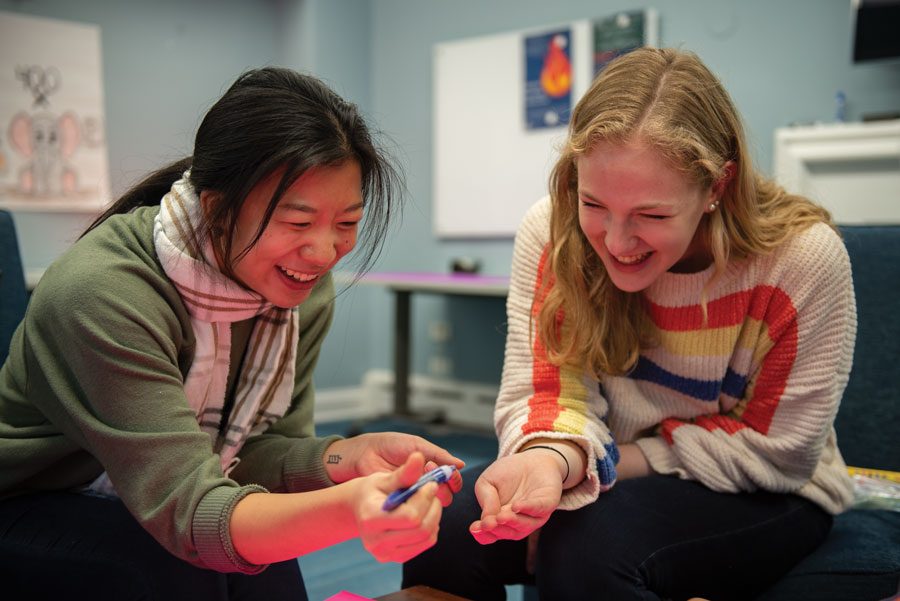Student activists express challenges in bringing members of privileged communities on board
Evan Robinson-Johnson/Daily Senior Staffer
Lucy Yang and Chloe Cohen working on a poster for the Chicago Marathon. Lucy Yang said it can be difficult to find and retain engaged members who do not already identify with the marginalized group in need.
October 13, 2019
In 1960, four undergraduate students in Greensboro, N.C. famously staged the first sit-in, refusing to leave a lunch counter to protest racial inequality. In the months that followed, thousands of students replicated this protest in more than 50 cities, and this simple, nonviolent act of resistance became a symbol for the power of student activism.
College campuses are still widely recognized as hubs for progressive social justice activism — however, many Northwestern students feel that most of the students who participate in advocacy hold marginalized or underrepresented identities.
Northwestern currently has 37 organizations dedicated to advocacy in some form, but Weinberg senior Lucy Yang said it can be difficult to find and retain engaged members who do not already identify with the marginalized group in need.
Yang is the diversity and inclusion chair for Northwestern’s chapter of Girl Up, which operates through the United Nations Foundation to promote intersectional feminism for girls around the world. She said that since the organization is mainly centered around women’s rights, it can be difficult to attract male-identifying members.
“Activism is very interesting, because you can say you’re a feminist but not do anything,” Yang said. “The core group of activists are oftentimes people who have marginalized identities, and it’s really hard to get other people with different identities to be allies and stuff. It’s like, what is an ally really do? Everyone is a little confused about that sometimes, and it definitely presents a challenge.”
Weinberg junior Mara Kelly has noticed similar trends in her political activism work. Kelly is currently interning for Marie Newman’s congressional campaign for Illinois’ 3rd District, and actively advocates for the progressive politics and changes she wants to see in Washington.
Kelly said many people traditionally think of activism and politics as separate entities, but she believes there are a lot of opportunities to advocate for change within the political system.
She added that while she has enjoyed working Newman’s campaign with other passionate young people, she has noticed that students with agent identities — identities that are typically perceived as more privileged with access to power and resources — are often less likely to get involved.
“I think the sort of people who would be drawn to activism are people who are experiencing injustice themselves,” Kelly said. “The most privileged people in society who aren’t directly experiencing that injustice probably would be less likely to be activists.”
SESP junior Christine Hwang is the co-president of NU’s chapter of Active Minds, which works to destigmatize conversations about mental health on college campuses.
Hwang — who emphasized that she doesn’t speak for all student activists — said she believes students feel they are unable to participate in conversations surrounding social justice activism because they are unfamiliar with the terminology that is used.
She said that while marginalized students should continue to vocalize their struggles, the true purpose of activism is to create change, and that is impossible without the creation of a space for other parties to learn and contribute to the conversation. Those conversations, she added, should be conducted in mind of what identities, experiences and power dynamics are present in the room and influencing the conversation.
“It’s really important for dialogue to happen,” said Hwang. “There are certain cases where if the only goal is to shame a certain party or do something like that, it might not lead to anywhere even though more radical movement is for sure necessary. There are different components in activism that all have to complement each other, one of which is also listening to your so-called opponents and building relationships with those you are advocating with and for as well as the people who are preventing you from achieving your goals.”
Email: ashleycapoot2022@u.northwestern.edu
Twitter: @ashleycapoot



